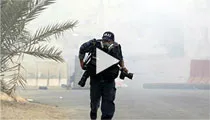Authoritarian leader Emomali Rahmon praised journalists’ mission at a ceremony said to mark the centennial of the Tajik press, but his speech came with a contradictory message: Rahmon urged news outlets not to publish reports that could damage Tajikistan’s international image, cause pessimism, or undermine public order. Such was the gap between rhetoric and reality. Rahmon signed into law a measure decriminalizing libel, even as statutes still impose prison penalties of up to five years for coverage deemed insulting to the president. The authorities blocked access to several independent news websites for up to three months after the outlets questioned the official account of a security general’s killing and alleged that Rahmon had stepped up surveillance of local religious groups. Among the blocked outlets were both local and international outlets, including the popular Asia Plus, Ferghana News, Lenta, and the BBC, the Dushanbe-based National Association of Independent Mass Media in Tajikistan reported. The authorities also announced the creation of a volunteer-staffed cyberunit to identify supposedly extremist content and material insulting to the president. Citing the unit’s findings, the state communications chief declared Facebook a “hotbed of slander” and ordered it blocked nationwide.
Tajikistan
» Authorities decriminalize defamation, but insulting president is still a crime.
» Several independent news websites are blocked after critical stories.
Authoritarian leader Emomali Rahmon praised journalists’ mission at a ceremony said to mark the centennial of the Tajik press, but his speech came with a contradictory message: Rahmon urged news outlets not to publish reports that could damage Tajikistan’s international image, cause pessimism, or undermine public order. Such was the gap between rhetoric and reality. Rahmon signed into law a measure decriminalizing libel, even as statutes still impose prison penalties of up to five years for coverage deemed insulting to the president. The authorities blocked access to several independent news websites for up to three months after the outlets questioned the official account of a security general’s killing and alleged that Rahmon had stepped up surveillance of local religious groups. Among the blocked outlets were both local and international outlets, including the popular Asia Plus, Ferghana News, Lenta, and the BBC, the Dushanbe-based National Association of Independent Mass Media in Tajikistan reported. The authorities also announced the creation of a volunteer-staffed cyberunit to identify supposedly extremist content and material insulting to the president. Citing the unit’s findings, the state communications chief declared Facebook a “hotbed of slander” and ordered it blocked nationwide.
The authorities continued to censor the news and moved against their critics online. At least three times in 2012, in March, July, and November, the state communications agency ordered local Internet providers to block access to independent news outlets, as well as the social networks Facebook and YouTube. The agency failed to provide court orders as required by law, but it threatened to withdraw licenses from those who resisted, local press reported.
| 5 Tajik | Asia Plus, TojNews, TjkNews, Ozodagon, Vatandor |
| 4 Russian | Lenta, Vesti, Polyarnaya Zvezda, as well as the website of news agency RIA Novosti |
| 3 Regional | Ferghana News, CentrAsia, Maxala |
| 4 Global | BBC, Radio Free Europe/Radio Liberty's Tajik Service, Facebook, YouTube |
Vicious assaults were reported inside the country and beyond its borders. At least two critical journalists had to seek medical treatment after surviving the attacks.
January 2012: | Dododzhon Atovulloyev, exiled publisher and editor of the now-defunct pro-opposition Tajik newspaper Charogi Ruz, was stabbed at a Moscow restaurant. When his newspaper was banned in Tajikistan in 1992 in retaliation for his criticism of Rahmon's policies, Atovulloyev moved it to Moscow a year later, and continued to publish Charogi Ruz from exile. |
May 2012: | Unidentified assailants brutally beat Daler Sharifov, a journalist for the state TV channel Safina, the U.S. government-funded Radio Free Europe/Radio Liberty reported. The journalist told Asia Plus that he had received threats beforehand. Sharifov had hosted a talk show in which guests discussed social and economic problems in Tajikistan. |
State officials continued their practice of filing retaliatory defamation complaints against news outlets that publish critical stories. In 2012, a municipal official in Dushanbe sought 500,000 somoni (US$105,000) in damages from the independent newspaper Farazh. The paper had reported on compensation awarded in a car accident that involved the official's vehicle, the National Association of Independent Mass Media, or NANSMIT, reported. The official eventually dropped his complaint, but CPJ research shows the filing of such suits has itself deterred critical coverage.
1 million somoni
Damages sought in January 2011 by an Interior Ministry general stemming from an Asia Plus article alleging police abuse of a detainee who died in state custody. The plaintiff dropped the case in October 2011.5.5 million somoni
Damages sought in February 2010 by three Dushanbe judges from Farazh and two other independent newspapers, Ozodagon and Asia Plus, over a report critical of their performance. The judges dropped the case a year later.Although Internet penetration in Tajikistan remained very low, local press freedom activists and reporters united against suppression of online speech. In response to the blocking of several popular news websites, activists began a protest called "100 days for Tajnet Freedom." The protest, which began in September, included a series of events aimed at exposing abusive state policies and helping residents achieve computer literacy, NANSMIT reported.

